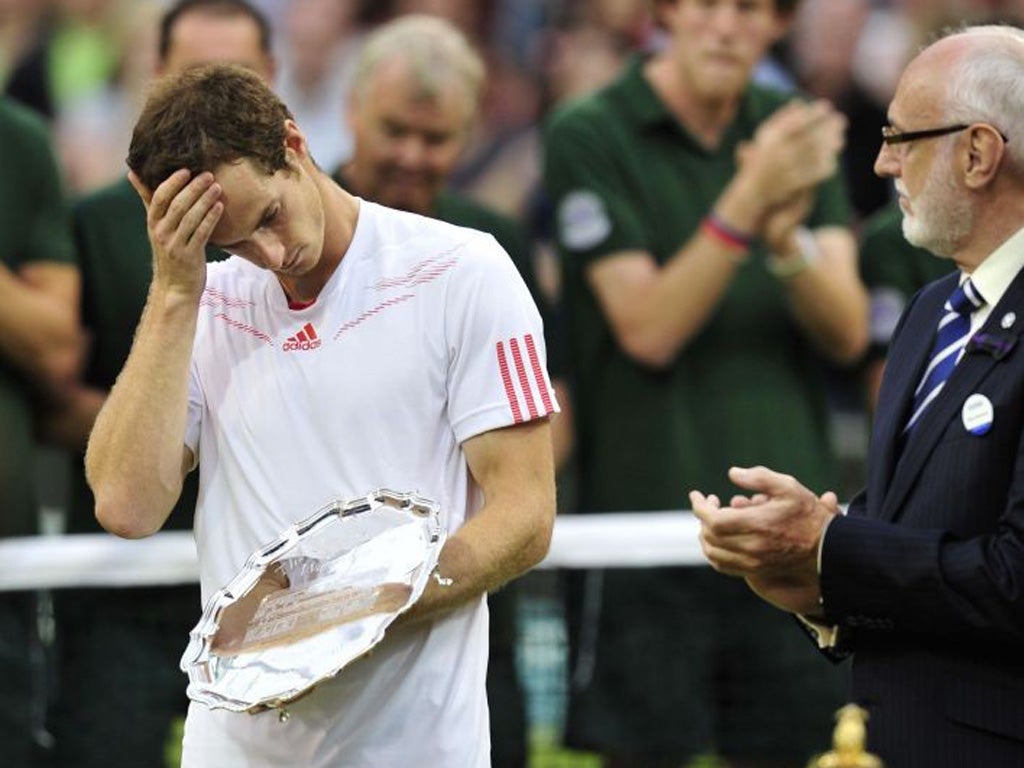James Lawton: History wasn't against Andy Murray. Unfortunately, Roger Federer was…
The fairytale ending was not to be. But the nation can take pride that Andy Murray held nothing back – not even his tears

Andy Murray couldn't deliver to the nation the opening passage of the golden summer of British sport but he did do pretty much the next best thing.
He did perform with much competitive honour and more than passing brilliance against Roger Federer – by common consent, the greatest player in the history of tennis.
It was never enough to match the feat of Fred Perry, who was the last male British player to win Wimbledon 76 years ago, but there were moments when the 25-year-old from Dunblane did threaten to ambush Federer on his way to his 17th Grand Slam title.
Federer, who is 30, was supposed to have passed his peak here four years ago when he was beaten by Rafael Nadal in what many regarded as the finest match ever seen on the famous old court. Yesterday, though, he went imperiously about the task of drawing level with Pete Sampras on the mark of seven Wimbledon wins, having bounced back from the 2008 defeat with victory the following year.
Yesterday, he recovered from the loss of the first set – when Murray, under the direction of his new coach, the multiple Grand Slam champion Ivan Lendl, attacked with nerve and great refinement of shot – to sweep the next three, winning 4-6, 7-5, 6-3, 6-4 in three hours, 24 minutes. Murray had the chance to go into a two-set lead but Federer repeatedly found some of the best of his game under pressure and, when his opponent over-hit a drive that would have brought a tie-breaker, Federer gained a grip that was only enhanced when the Centre Court roof had to be closed after a heavy rain shower. It meant that his often uncanny precision could be practised in perfect conditions.
At the end, Murray fought to hold back tears but, as he predicted, he failed. "I played my best tennis in a grand slam final," he declared, "I thought I played a lot of good shots, there were a lot of close games. When you lose it's hard, it's tough to take, but you need to try to show strength of character to come back from it. Hopefully, one day you get there."
This was Murray's fourth loss in a Grand Slam final – and the third to Federer, who has also beaten him in the US and Australian Opens. This, though, was the match that would have healed all wounds – and installed him as one of the great heroes of British sport.
The goal of winning a Grand Slam, particularly Wimbledon, remains his most insistent ambition, he says, but when Federer produced some of his most exquisite game, it was hard to ignore the theory that for all his gifts, Murray was born at the wrong time and in the most oppressive company.
It can't have been encouraging, certainly, when a surprisingly large section of the Centre Court crowd seemed to be supporting Federer, one male fan repeatedly shouting, "Roger, I love you – you're a genius."
On the last point Murray, at least privately, was bound to agree.
Join our commenting forum
Join thought-provoking conversations, follow other Independent readers and see their replies
Comments
Bookmark popover
Removed from bookmarks